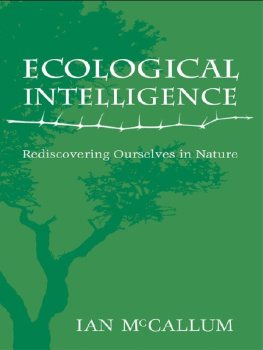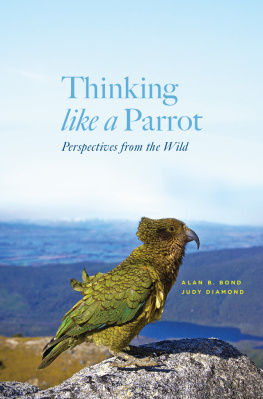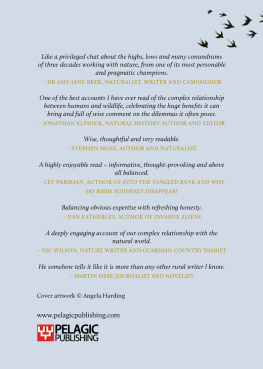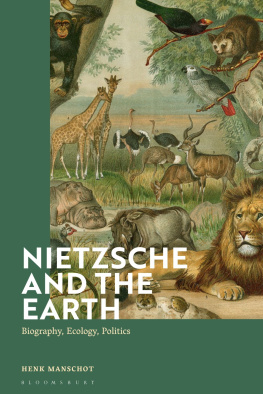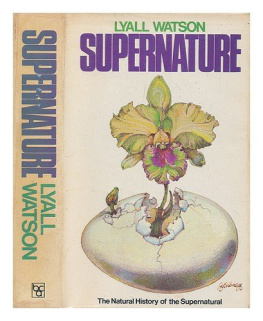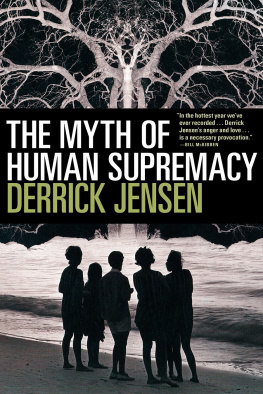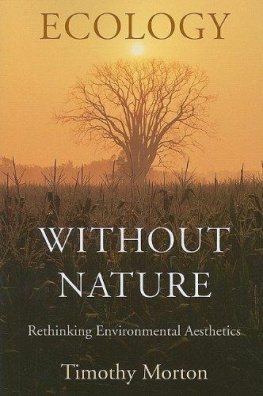ECOLOGICAL
INTELLIGENCE
REDISCOVERING OURSELVES IN NATURE
IAN McCALLUM
Foreword by Lyal Watson

2005, 2008 Ian McCallum
Originally published in 2005 by Africa Geographic.
All rights reserved. No part of this book may be reproduced, stored in a retrieval system, or transmitted in any form or by any means, electronic, mechanical, photocopying, recording, or otherwise, without written permission from the publisher.
The author gratefully acknowledges the permissions granted by the many individuals and publishers for material quoted and otherwise used in this book.
The excerpt on page 67 from A Brief History of Time by Stephen Hawking, published by Bantam Press, is used by permission of The Random House Group Limited.
The cartoon on page 95 from Goatperson and Other Tales by Michael Leunig, is used by permission of Penguin Books Australia.
The excerpt on page 97 from Robert Blys translation in The Selected Poetry of Rainer Maria Rilke , published by HarperCollins, and the excerpt on page 21 by Francis Ponge, translated by Beth Archer in News of the Universe , are used by permission of Robert Bly.
The excerpt on page 101 from Good Natured: The Origins of Right and Wrong in Humans and Other Animals by Frans B. M. de Waal is used by permission of Harvard University Press. 1996 by Frans B. M. de Waal.
The poem Lost on page 177 from Traveling Light: Collected and New Poems by David Wagoner, published by the University of Illinois Press, is used by permission of David Wagoner and the University of Illinois Press. 1999 by David Wagoner.
The excerpts on pages 132, 155, and 176, from Memoirs by Pablo Neruda, published by Penguin Books, are used by permission of Souvenir Press Limited.
The excerpt on page 218 from Billions and Billions by Carl Sagan, published by Random House, is used by permission of the Estate of Carl Sagan. 1997 by The Estate of Carl Sagan.
Library of Congress Cataloging-in-Publication Data
McCallum, Ian, 1944-
Ecological intelligence : rediscovering ourselves in nature / Ian McCallum ; foreword by Lyall Watson.
p. cm.
Originally published: Cape Town : Africa Geographic, 2005.
Includes bibliographical references and index.
ISBN 978-1-55591-687-9 (pbk.)
1. Environmentalism. 2. Green movement. 3. Environmental responsibility. 4. Nature--Effect of human beings on. I. Title.
human beings on.
GE195.M4 2008
304.2--dc22
2008039669

Printed on recycled paper in Canada by Friesens Corp.
0 9 8 7 6 5 4 3 2 1
Design by Jack Lenzo
Fulcrum Publishing
4690 Table Mountain Dr., Ste. 100
Golden, Colorado 80403
800-992-2908 303-277-1623
www.fulcrumbooks.com
This book is dedicated to three strange angels
the naturalist, the scientist, and the poet in all of us

The thorns of the tree Ziziphus mucronata are spaced along the length of every branch in pairs. One of the pair points robustly outward and forward while the other curves back and inward in the opposite direction. The Nguni African legend says the thorns tell us something about ourselvesthat we must look ahead to the future but we must never forget where we have come from.
CONTENTS
T HIS BOOK WOULD NOT HAVE BEEN POSSIBLE WITHOUT THE ADVICE, support, and inspiration of the following remarkable people: Peter Borchert, Alessandro Bonora, Gillian Black, Mary Duncan and Shelley Prince of Africa Geographic, Anne Anderson, Jean Badenhorst, Chris Bakkes, Joan Berning, Antony Burgmans, George Ellis, Barbara Fairhead, Chic and Danna Flack, Brian Gaze, Michelle and Steve Henley, Map Ives, Lochie Jacobs, Dereck and Beverley Joubert, Festus Mbinga, Marlene McCay, Ian McMillan and Ian Michler of Invent Africa, Gus Mills, Jock and Rosie Orford, Di Paice, Nita Permuy, Peter and Beverly Pickford, Ian Player and the Wilderness Foundation, Felicity Swanson, Hermann Wessels, Lyall Watson and Grant Woodrow.
A special thank you to my editor, Di Paice, and to Felicity Swanson, who was an essential part of the flow and early formatting of this book.
To the wild animals of the Okavango and of the Linyanti in northern Botswana, thank you for sharing your river with me and for helping me to redefine the word intelligence .
To Colin Bell, Malcolm McCullough, and Grant Woodrow of Wilderness Safaris, thank you for making my Linyanti adventures possible.
To the many Botswana guides with whom I have workedGreg Hughes, Vundi Kashamba, Marks Kehaletse, Bolatotswe Makgetho, Copper Malela, Frank Mashebe, Mike Myers, Moses Ntema, Clinton Phillips, James Pisetu, Isaac Seredile, and Maipaa Tekanyetsothank you for what we have shared.
Finally, to my best friend and wife, Sharonthank you for your love, your generosity of spirit, your patience, your attention to detail, and the countless hours you spent reading and rereading the manuscripts that gave rise to this book.
ecology [ee kol o ji] n. study of the relations of living organisms to their environment; study of ecosystems; study of the environmental conditions of existence (Croall and Rankin) intelligence [in telli jans] n. the capacity to learn from experience, to think in abstract or symbolic terms, and to deal effectively with ones environment (Atkinson, Atkinson, Smith, & Hilgard); the capacity of an animal to use tools, to solve problems, to find its way home, and to learn by imitation (Hauser)
Have we forgotten
that wilderness is not a place,
but a pattern of soul
where every tree, every bird and beast
is a soul maker?
Have we forgotten
that wilderness is not a place
but a moving feast of stars,
footprints, scales and beginnings?
Since when
did we become afraid of the night
and that only the bright stars count?
Or that our moon is not a moon
unless it is full?
By whose command
were the animals
through groping fingers,
one for each hand,
reduced to the big and little five?
Have we forgotten
that every creature is within us
carried by tides
of Earthly blood
and that we named them?
Have we forgotten
that wilderness is not a place,
but a season
and that we are in its
final hour?
We are connected with each other in surprising ways.
I LEARNT THIS WHEN I WAS JUST EIGHT YEARS OLD, A CURIOUS CHILD TAKING pleasure in wandering barefoot and alone across the Great Karoo, semidesert plain that covers most of South Africas dry interior.
At first acquaintance these are bleak places, rusty and unforgiving, stretching to horizons broken only by occasional flat-topped stone koppies. But like all deserts, their delights lie in the detail.
Every day I discovered something new. Floral stones sculpted by the sun and wind and, between them, a wonderful variety of succulent plants camouflaged to look like pebbles waiting patiently for the next rare fall of rain. And once in a while I would be encouraged to encounter a whip-tailed lizard, a trap-door spider, or even a fossil shell left behind by an ancient sea.
These signs of life delighted me. They promised continuity, but I was totally unprepared for what I stumbled over one cloudless day
It was a shiny stone, larger than my foot, one amongst many others, polished by the elements with reflective desert varnish. But this one was different. It was golden and beautifully shaped with the sort of symmetry that set it apart from the others. More than just a stone.
Next page
